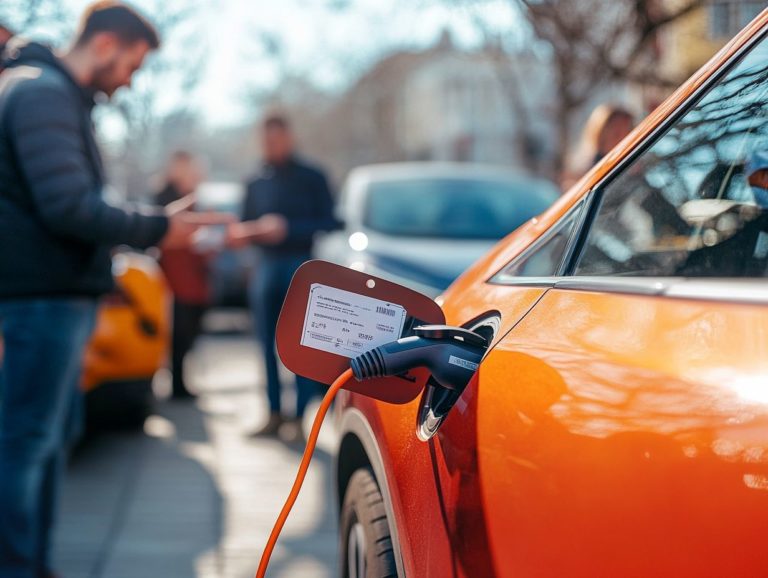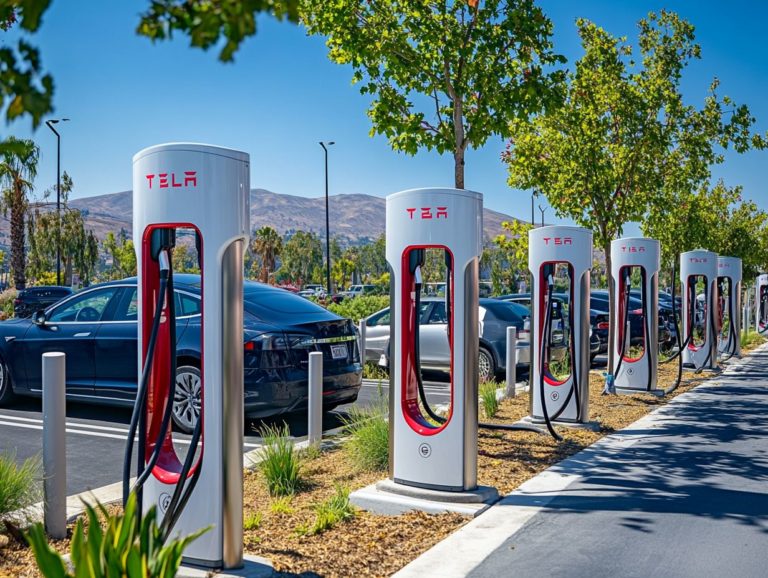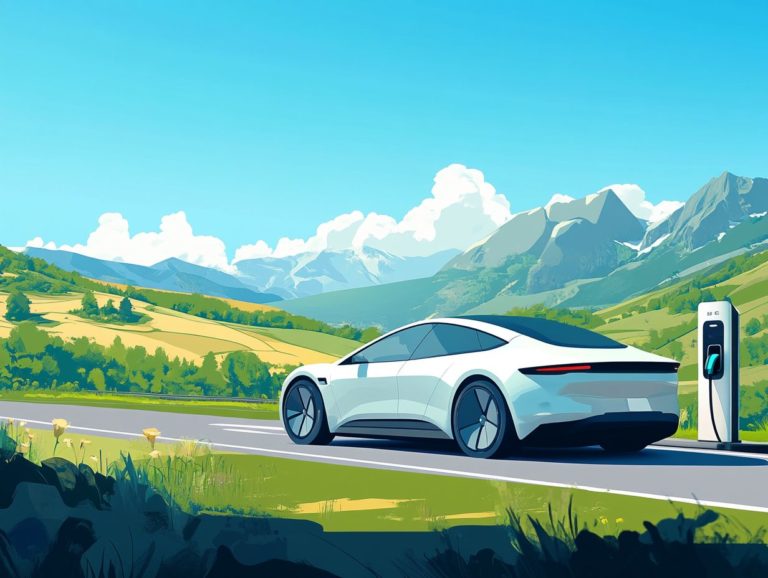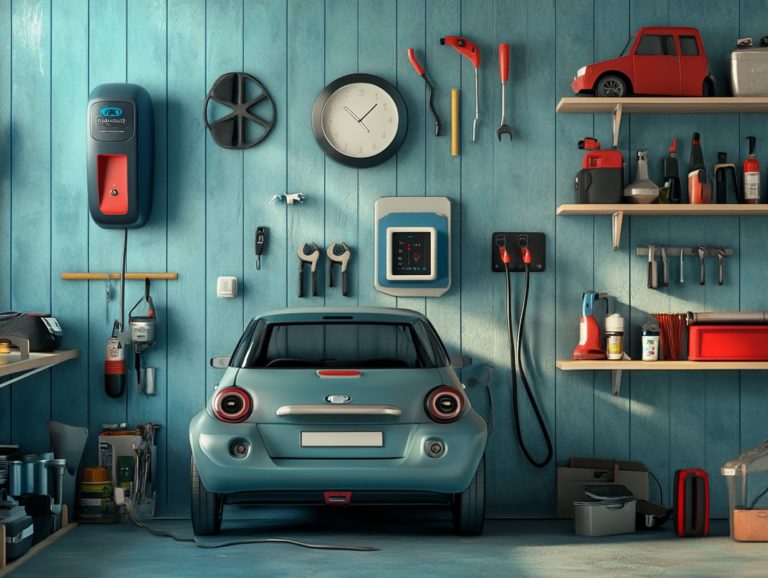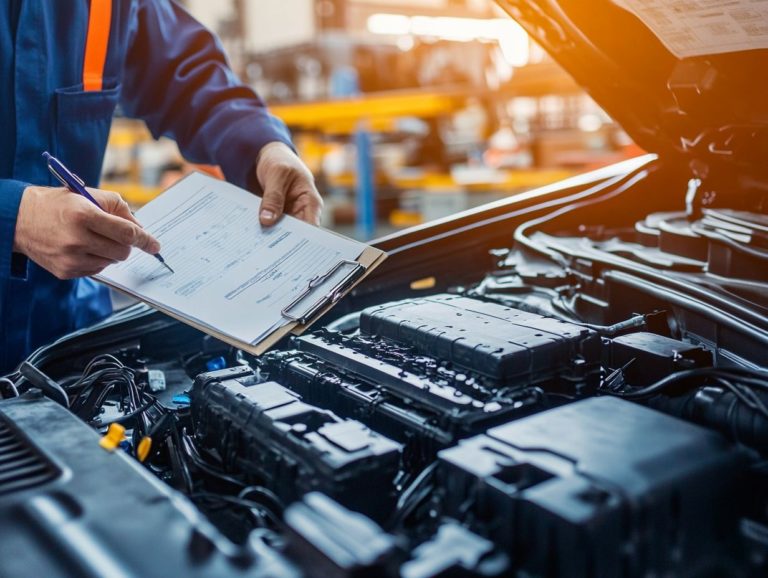what are the most common ev repairs?
Electric vehicles (EVs) are changing how we think about transportation. However, like any vehicle, they still need maintenance and the occasional repair.
This article outlines common repairs for EVs, including battery maintenance, charging system issues, and electric motor concerns. We ll also break down repair costs, factors influencing pricing, and share preventive maintenance tips to help you avoid unexpected expenses.
You will also find guidance on how to locate a trustworthy EV repair shop. Dive in to keep your electric ride running smoothly!
Contents
Key Takeaways:
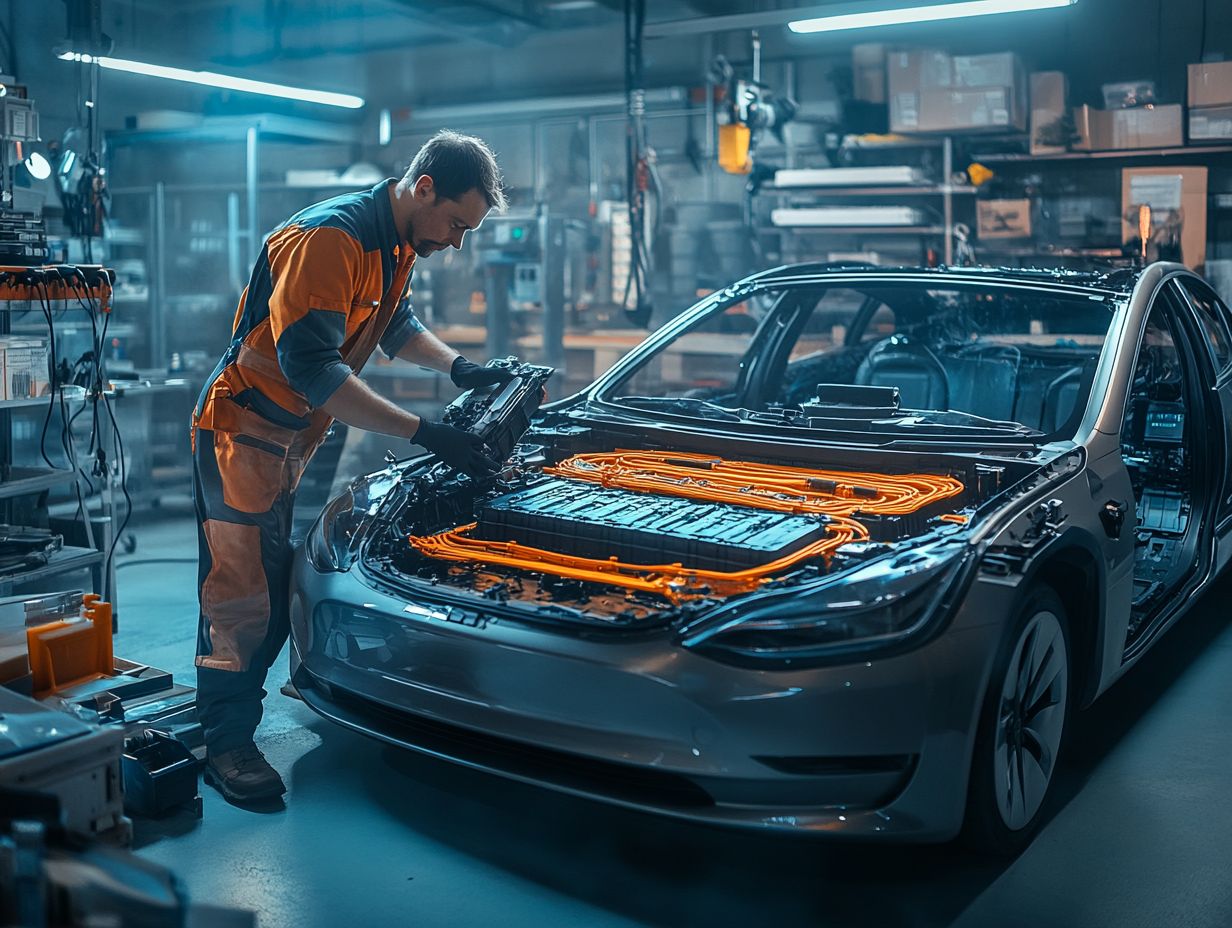
Regular battery maintenance and replacement are crucial for EVs, as this is the most common repair needed. Issues with the charging system and electric motor are also frequent, so it’s important to keep them in check.
To avoid costly repairs, follow preventive maintenance tips and find a reliable EV repair shop for any necessary fixes.
Understanding Electric Vehicles
Understanding electric vehicles (EVs) is essential for anyone considering a shift to sustainable transportation. These innovative machines use electric motors instead of traditional engines and rely on batteries for power.
This change enhances performance and improves their environmental impact. Features like charging ports allow for easy electricity replenishment, while regenerative braking systems boost efficiency.
Managing battery capacity is key to maximizing your vehicle’s efficiency. By embracing electric vehicles, you can reduce your carbon footprint and enjoy lower operating costs.
With fewer moving parts, EVs are often more cost-effective to maintain. The growing network of charging stations makes owning an EV even more convenient, letting you travel longer distances with ease.
Thanks to ongoing advancements in battery technology, battery life is improving and maintenance frequency is decreasing. As society shifts towards greener alternatives, the role of EVs in reducing greenhouse gas emissions is becoming even more important.
Common Repairs for EVs
Common repairs for electric vehicles (EVs) differ significantly from traditional vehicles. This is due to their unique parts, such as electric motors and advanced battery systems.
Battery maintenance is critical. This may include battery replacement and understanding how battery performance changes over time.
You may also face challenges with:
- Charging systems
- Brake systems
- Tire maintenance
- HVAC systems
- Electrical issues
These typically require the expertise of qualified technicians.
Battery Maintenance and Replacement
Battery maintenance and replacement are vital for your EV’s performance and longevity. Regular checks on your battery’s capacity can help you spot early signs of degradation.
Understanding typical repair needs and replacement costs will help you make informed decisions about using authorized service centers. This ensures safety and effectiveness.
Monitoring your battery health means checking for temperature fluctuations and charge cycles. A significant drop in range or slow charging speed should prompt immediate action.
Choosing authorized service centers means skilled technicians will handle your vehicle with genuine parts. This is crucial for extending battery life and performance.
Following best practices enhances your driving experience and protects your vehicle and the environment. Making informed choices is essential for your satisfaction as an EV owner.
Charging System Repairs
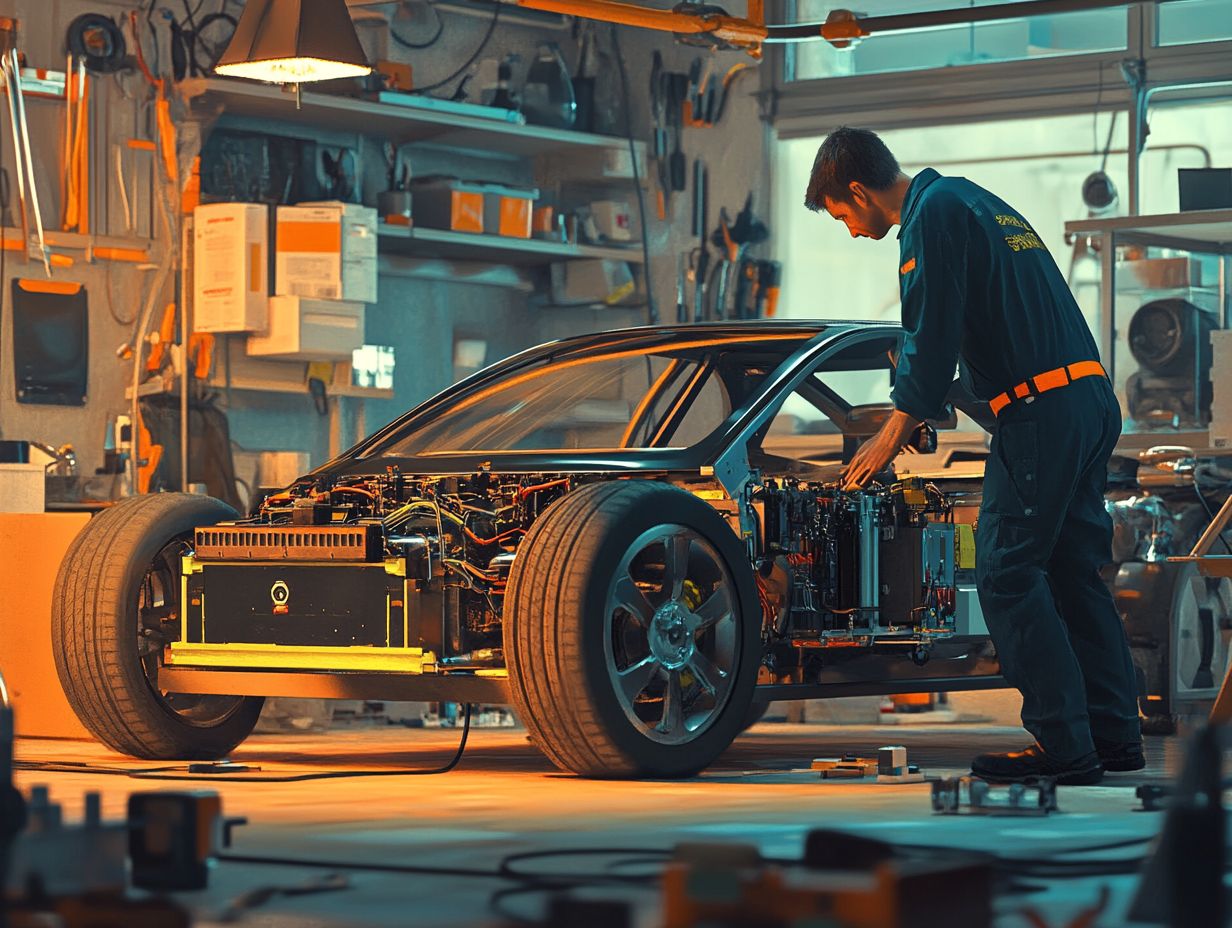
Charging system repairs are vital for your electric vehicle’s efficiency. They ensure your energy source remains reliable.
Repairs cover the charging port, onboard chargers, and the system that manages your battery s performance. These components work together to optimize energy flow.
A malfunctioning charging port can lead to slower charging times. If ignored, it may cause serious electrical issues down the road.
Regular inspections catch problems early and save you trouble later.
Software updates enhance the functionality of these systems. They help technicians resolve glitches and improve overall performance.
Electric Motor Issues
Electric motor issues are a major concern for EV owners. These components are crucial for your vehicle’s performance.
Understanding potential failures can help you address problems early. This proactive approach can enhance your vehicle’s performance and extend its lifespan.
You might face challenges like overheating or electrical shorts. Each can negatively impact your driving experience.
A malfunctioning electric motor affects acceleration and energy efficiency. Delaying repairs can lead to costly replacements later.
Regular inspections and timely repairs keep your vehicle running smoothly. This approach greatly improves your EV’s reliability.
Costs of EV Repairs
The cost of EV repairs can vary widely. Factors include the type of repair, parts availability, and labor charges.
Understanding replacement costs prepares you for potential expenses. Knowing what influences these costs helps you budget effectively.
Factors Affecting Repair Costs
Several factors influence repair costs for EVs. The complexity of repairs and parts replacement costs matter significantly.
Complex repairs can affect your vehicle s performance and reliability. Grasping these elements impacts your maintenance budget.
Specialized technicians offer invaluable expertise but may charge a premium. Authentic parts can also be pricier than aftermarket options.
Your location plays a role, as urban areas usually have higher labor rates. Additionally, your vehicle’s warranty status may cover some repairs, affecting out-of-pocket costs.
Preventive Maintenance for EVs
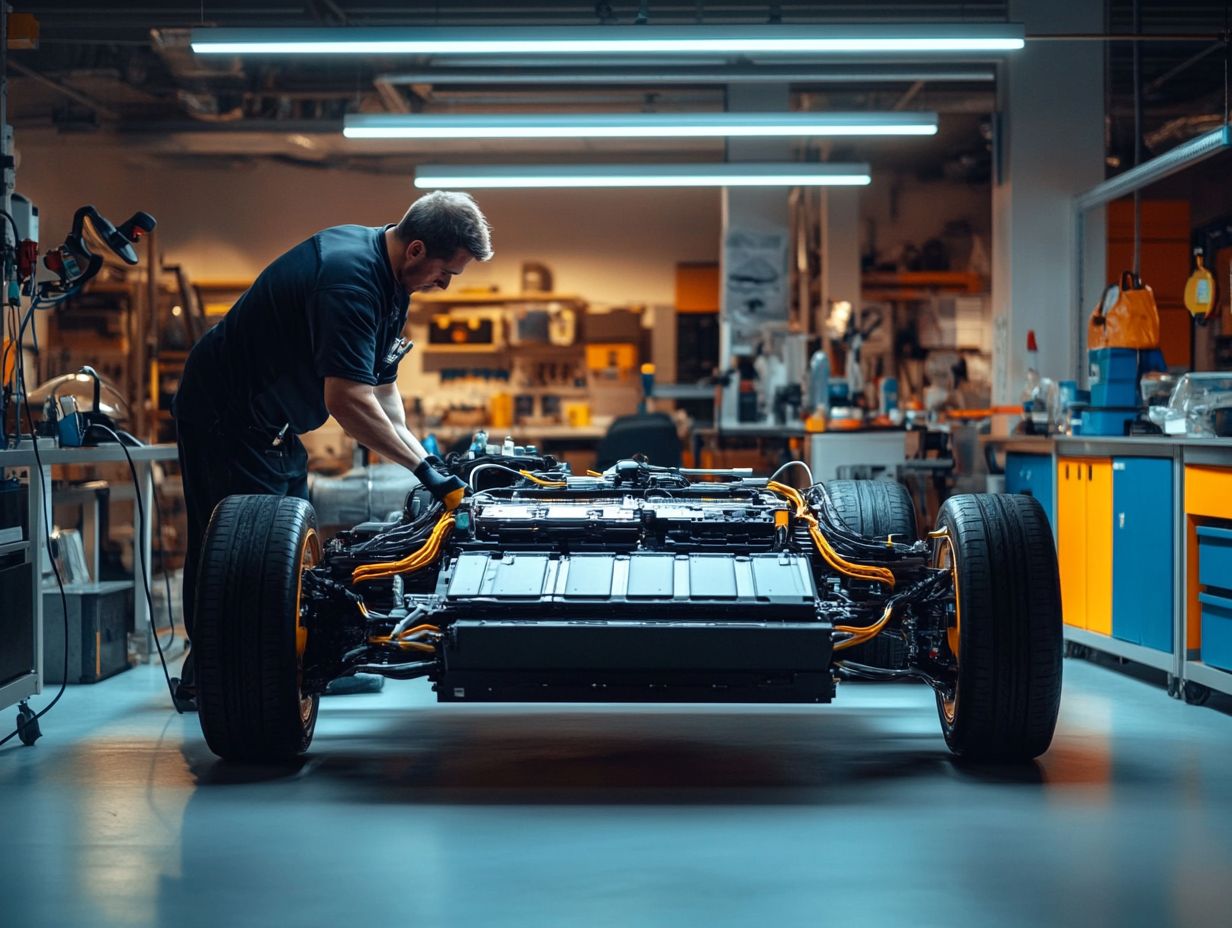
Preventive maintenance is key for optimal performance and longevity. It also keeps potential repair costs at bay.
Regular maintenance tasks include:
- Tire rotations
- Checking fluid levels
- Managing the cooling system to prevent overheating
By following effective maintenance tips, you can keep your vehicle healthy. This ensures it performs at its best for years to come.
Tips for Avoiding Costly Repairs
Avoiding costly repairs for your electric vehicle (EV) requires a proactive approach to maintenance. Emphasizing the significance of routine checks and preventative measures is key.
Key maintenance tips include diligent battery care, tire upkeep, and inspecting the Heating, Ventilation, and Air Conditioning (HVAC) system for any potential issues that could escalate into expensive repairs over time.
By ensuring your battery remains at optimal charge levels and closely monitoring its health, you can prevent performance degradation that often leads to higher replacement costs.
Maintaining proper tire pressure and alignment enhances your driving efficiency and extends the life of your tires, significantly reducing replacement expenses.
Regularly checking your braking system and keeping an eye on coolant levels are additional steps that can help you sidestep unforeseen and costly repairs.
Ultimately, these simple practices can save you a lot of money in the long run!
Finding a Reliable EV Repair Shop
Finding a reliable EV repair shop is essential for you as an electric vehicle owner. This ensures that you receive quality repairs and maintenance from qualified technicians.
Seek out authorized service centers that strictly adhere to safety protocols and legal considerations. Understand your rights as a customer regarding repairs and warranties.
A trusted repair shop will deliver the necessary automotive services and enhance your vehicle s overall efficiency and performance.
Important Considerations
Several key considerations should guide you in selecting a reliable repair shop for your electric vehicle (EV):
- Look for the experience of the technicians.
- Evaluate the shop’s reputation.
- Check their adherence to authorized service standards.
Understanding your rights as a customer in the maintenance and repair process is essential. This ensures you receive fair treatment and quality service.
As you search for the right shop, evaluating the qualifications of the technicians is crucial. Their expertise directly impacts the care and performance of your EV systems.
Established customer rights play a significant role in this process, ensuring you are informed about your options and that any warranty issues are respected. This awareness enables you to ask pertinent questions and seek out shops that specialize in electric vehicles, maintain transparency about their services, and prioritize eco-friendly practices.
Adopting a well-rounded approach not only enhances the quality of repairs but also fosters trust between you and the service provider.
Frequently Asked Questions
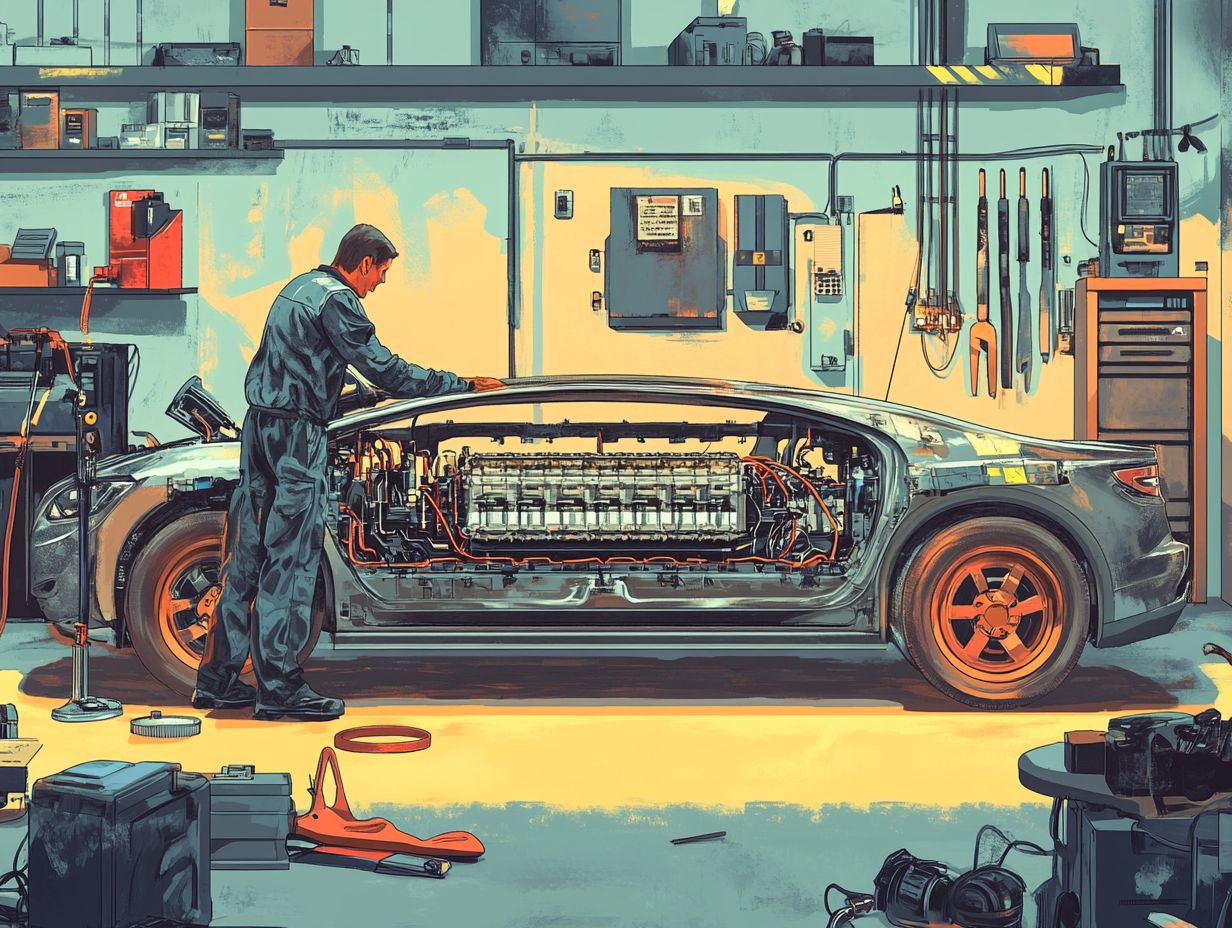
What are the most common EV repairs?
The most common EV repairs include:
- Battery replacement
- Tire rotation and replacement
- Brake system maintenance
- Charging port repairs
- Software updates
What are some signs that my EV needs repairs?
Signs that your EV may need repairs include:
- Reduced battery range
- Strange noises or vibrations while driving
- Warning lights on the dashboard
- Difficulty charging the vehicle
How often do EVs need to be serviced?
EVs typically need to be serviced once a year or every 10,000-15,000 miles, depending on the manufacturer’s recommendations. This may vary based on your driving habits and the condition of your vehicle.
Can I take my EV to any mechanic for repairs?
It is recommended to take your EV to a certified mechanic or dealership for repairs. They will have the necessary knowledge and equipment to properly service your vehicle, especially when it comes to the high-voltage components of an EV.
Are EV repairs more expensive than traditional car repairs?
Repairs for EVs may initially be more expensive due to specialized components and technology involved. However, EVs typically have lower maintenance costs in the long run due to fewer moving parts and less frequent oil changes.
Are there any maintenance tasks I can do myself to prevent common EV repairs?
Yes! You can perform some maintenance tasks yourself to help prevent common EV repairs:
- Regularly check and maintain proper tire pressure.
- Keep the battery charged.
- Follow the manufacturer’s recommended maintenance schedule.

